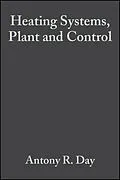In many climates buildings are unable to provide comfort conditions
for year-round occupancy without the benefit of a heating system,
and most HVAC engineers will routinely be involved with issues
concerning the design, installation and performance of such
systems. Furthermore, in temperate climates, heating of buildings
accounts for a large slice of annual carbon emissions. The design
of heating systems for maximum efficiency and minimum carbon
emission is therefore now a matter of prime concern to all HVAC
engineers.
The book provides an up-to-date review of the design,
engineering and control of modern heating systems. Part A deals
with heat generating plant. While this concentrates on conventional
and condensing boilers, small-scale combined heat and power systems
and heat pumps are also discussed. Part B deals with heat emitters,
pipe circuits and variable-speed pumping, hot water service,
optimum plant size and the vital issues of plant and system
control, including sequence control of multiple boilers. Techniques
for managing the energy use and running costs of heating systems
are also discussed.
The authors have brought together over a half-century of
combined experience covering all aspects of the building services
Industry to provide an up-to-date and comprehensive text that is
both technically rigorous yet highly practical. This makes the book
equally relevant to the busy HVAC engineer looking for a handy
practical reference, the student looking to build on their basic
knowledge or the researcher interested in key issues of heating
system design and performance.
Autorentext
Tony Day BEng (Hons), PhD, CEng, MCIBSE, MInstE is a
Senior Lecturer at South Bank University where he is course
director of the MSc in Building Services Engineering. He
specializes in evaluating energy use in buildings and also lectures
in the wider context of energy and the environment. He has
published a number of papers on building energy analysis, as well
as the development of renewable energy systems. Before entering
academia he was a Chief Engineer at a London hospital.
Martin Ratcliffe BSc (Hons), CEng, MCIBSE has been
involved in building services for more than 25 years, working as a
senior mechanical engineer at a large international consultancy
and, for the last 14 years, Senior Lecturer and course director for
Building Services at South Bank University. In this last role he
has concentrated on teaching the holistic design of mechanical
services with emphasis on performance and energy consumption and
has been involved with recent CIBSE and BSRIA design
guides.
Keith Shepherd BEng (Hons), MSc is a building services
consultant. A graduate of the Institute of Environmental
Engineering at London's South Bank Polytechnic, where he
gained first class honours in environmental engineering, he was
awarded a Master of Science degree by research from UMIST. Author
of a book VAV Air Conditioning Systems (also published by
Blackwell) and several papers, his 22 years' experience of
building services encompasses design, project management, research,
lecturing, estimating and quantity surveying.
Zusammenfassung
In many climates buildings are unable to provide comfort conditions for year-round occupancy without the benefit of a heating system, and most HVAC engineers will routinely be involved with issues concerning the design, installation and performance of such systems. Furthermore, in temperate climates, heating of buildings accounts for a large slice of annual carbon emissions. The design of heating systems for maximum efficiency and minimum carbon emission is therefore now a matter of prime concern to all HVAC engineers.
The book provides an up-to-date review of the design, engineering and control of modern heating systems. Part A deals with heat generating plant. While this concentrates on conventional and condensing boilers, small-scale combined heat and power systems and heat pumps are also discussed. Part B deals with heat emitters, pipe circuits and variable-speed pumping, hot water service, optimum plant size and the vital issues of plant and system control, including sequence control of multiple boilers. Techniques for managing the energy use and running costs of heating systems are also discussed.
The authors have brought together over a half-century of combined experience covering all aspects of the building services Industry to provide an up-to-date and comprehensive text that is both technically rigorous yet highly practical. This makes the book equally relevant to the busy HVAC engineer looking for a handy practical reference, the student looking to build on their basic knowledge or the researcher interested in key issues of heating system design and performance.
Inhalt
Introduction..
Part A. Heat Generation.
Boilers and Burners.
Types of Boiler and Their Needs.
Alternative Means of Heat Generation.
Flueing.
Part B. Systems and Control.
Room Heat Emitters.
Heating Circuits.
Hot Water Services.
Sizing Central Boiler Plant.
Matching Output to Demand.
Energy Consumption of Heating Systems.
Index.
